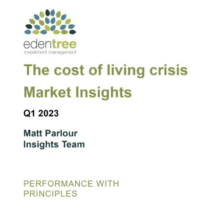We have a market situation not previously seen, either through the 2008 crash, the 1987 crash or anything else, says Richard de Lisle, fund manager, VT De Lisle America Fund. So what’s driving it – inflation, recession or something else?
My favourite technical indicator is the American Association of Individual Investors’ Sentiment Indicator, the AAII. Every week they ask their members where they feel the stock market will be in six months? Anyone can have a go, just sign up $2 for membership and join the 2 million who have been members over the years. You might think it facile, or even non-scientific. Surely vested interests could rig the vote? Or do you think that individuals don’t matter so much in the market these days?
My response is that no concern matters at all because it works better than any other single indicator and I’ve been following it since the late 1980s when it started. One clue for all those other surveys which don’t work so well: the AAII asks you what you feel, not what you think! Real world and real action not just the intellectual idea.
Recently I was asked to evaluate our position in Winnebago, a consumer discretionary which is out of favour along with anything else that depends on the consumer buying anything they don’t have to. On a trailing P/E of 5 and with a record backlog, I’m not worried about it but didn’t expect to research and discover that it has never sold so cheaply in the last 40 years.
Extending the analysis to other like-minded durables, I found similar results: single figure P/Es, insider buying and at new records of cheapness not previously seen, either through the 2008 crash, the 1987 crash or anything else. We now have boating stocks cheaper than when they were scuttling boats in the bayous to avoid paying insurance and marina fees. We have housing stocks below book and we have our Fund, according to Morningstar, trading on a P/E of 6 compared with a typical P/E in the last decade of 14.
How can this be? How can it be more scary now than at the start of the pandemic, the Great Financial Crash, the Tech Bubble implosion into the 2002 recession and so on?
We know it’s not the war as Americans tell us. One clue popped up in the consumer sentiment survey where the expectation of being worse off has climbed to 32%, the worst since survey inception in the 1940s. We therefore know it’s those twin horsemen of recession and inflation driving this – but how scared should we be?
The answer has helpfully been provided by the AAII. In a year of hyperbole, with no one any longer surprised by inflation at a 40-year high, consumer confidence at a 40-year low and job tightness at a 50-year high; the AAII has just trumped the lot by rewriting the record books. Bullish sentiment recently hit 16%, a 30-year low. Most importantly, it has now been below average for a record 26 consecutive weeks and I can’t find any previous run longer than 14.
In a ‘Eureka’ moment, we have the answer. The stocks are low because of pessimism, not because of a desperate future.
Why so glum? Maybe because growth stocks have been the place to be these last 14 years and the sea change has lost quite a few overboard and made the rest sick? Stocks like Netflix are no longer bailed out by zero interest rates and buying the dip no longer works. Maybe because current investors don’t remember the 70s and they think they are mayhem and unknown?
Markets don’t like change and uncertainty and we have plenty.
However, the AAII gives us the answer. All we need is to imagine what will normalise sentiment and we’re home. If recession doesn’t come or inflation recedes, who benefits? If they both come as hard and bad as imagined, who benefits?
Sentiment will soon normalise and we are very rapidly moving to fully invested, having been about 8% liquid most of this year. We’re buying those consumer discretionary stocks which have never been so cheap relative to staples and utilities but most of all we’re going even more overweight primary producers and intermediary industrials that did so well in that wonderful decade, the 1970s.
[Main image: priscilla-du-preez-YXJ3EGKPlCY-unsplash]



































